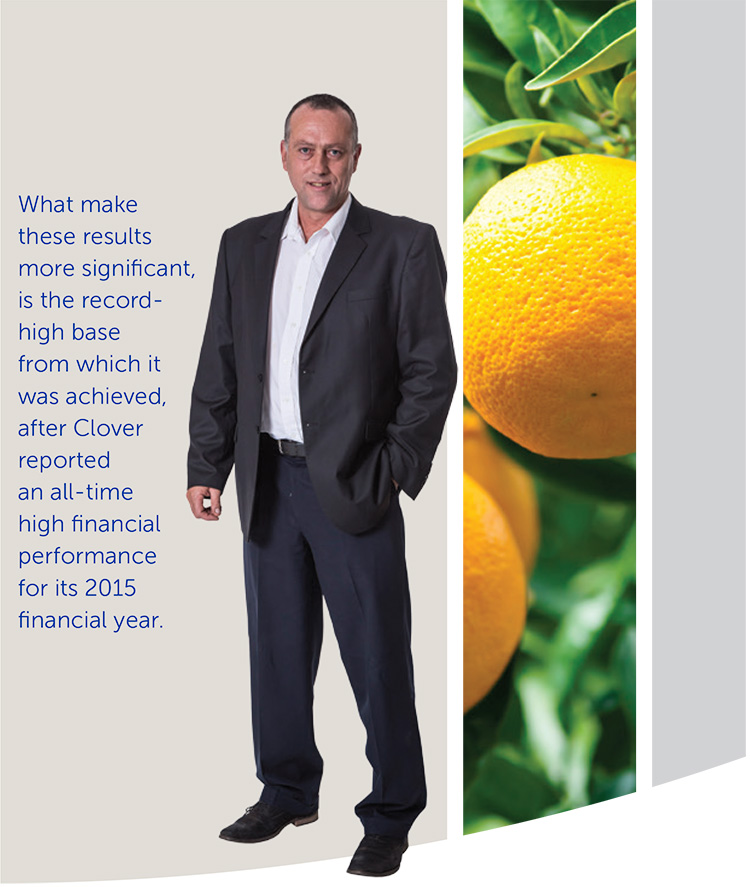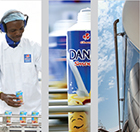Business review
Chairman's report
Dear Stakeholder,
This is Clover's third Integrated Annual Report structured according to the principles of the International Reporting Council's framework. It is aimed at providing you with a concise and transparent overview of our business activities as well as our impact and performance against legislative requirements, standards, and best practice including the six capitals.
Since listing in December 2010, Clover's strategy has been to diversify away from bulk, commoditised foodstuff into branded, higher margin value-added products. Although our roots will always firmly remain in dairy, our short-term aim remains to achieve an equal margin contribution from non-dairy/new products and traditional dairy products respectively.
MACRO-ECONOMIC ENVIRONMENT
The Bureau for Food and Agricultural Policy has published their 12th baseline agricultural outlook covering 2016 to 2025. It should be read for context on the global and domestic dairy industry and is available here.
The past financial year has been a ‘tale of two halves' with record raw milk volumes in the first two quarters diminishing sharply as one of the worst droughts on record impacted much of southern Africa. At the same time, a rising interest rate cycle, political instability (especially over December 2015) and the continued threat of a sovereign ratings downgrade wreaked havoc with the currency volatility.
For dairy processors such as Clover, these macro-economic dynamics resulted in downwards pressure on selling prices, rising input costs and a stagnant domestic economy, as South Africa narrowly avoided a third quarter contraction in GDP growth. Growth is currently forecast at zero percent.
It is therefore all the more pleasing to report a solid improvement in headline earnings per share, up 8,9% or 15,3 cents to 188,9 cents (2015: 173,6 cents). Normalised earnings per share also improved by 8,7% to 192,2 cents. (2015: 176,9 cents.)
Operating margins increased to 5,7% from 5,5% whilst normalised operating margin (calculated as normalised operating profit as a percentage of revenue excluding raw milk sales) increased from 5,2% to 5,9%.
Mr Elton Bosch's report here elaborates more on Clover's financial performance.
What make these results more significant, is the record-high base from which it was achieved, after Clover reported an all-time high financial performance for its 2015 financial year.
We've always maintained that Clover has a number of levers to mitigate against risks and on behalf of the Board I commend the management team under the leadership of Mr Johann Vorster for their initiatives to reduce costs and optimise efficiencies in an environment where cost increases could not be passed on to the consumer without significant volume and market share risk. Johann shares more on how he and his team implemented and unlocked value from our strategy in his report here.
The precarious operating environment, characterised by increased cost inflation and neutral selling prices resulted in the absorption of above inflationary cost increases into the margin of certain products to protect volumes and market share, as reflected in the margin growth lagging the strong volume growth reported.
By April 2016 stability was required in the primary industry and Clover successfully negotiated retail selling price increases for the benefit of our producers.
Despite these headwinds, our value-added products performed well with healthy volume growth. Following capacity upgrades, the 87% volume growth reported for our higher value fermented products and deserts is particularly pleasing.
Our non-alcoholic beverages portfolio performed above expectations, supported by successful price increases in July 2015 and heatwave conditions experienced over the December holidays.
Following our exit from the Danone contract, revenue from principles is still lower than in prior years, however I'm particularly encouraged by the progress made in filling excess capacity primarily with our own products, particularly the yoghurt and custard range. This was partially supported further by the acquisition of Nkunzi Milkyway Proprietary Limited (which saw us enter the Ayrshire and Organic Milk markets) Frankies and Good Hope (our entry into soya based milk alternative products and export markets) as well as new principal business.
Over the past number of years, Clover has invested significantly into its business. The Board is satisfied that plant and equipment has been sufficiently upgraded to support future growth and capacity requirements and no new significant capital projects are anticipated.
As this cycle in our evolution concludes, our focus is on delivering the expected targeted returns from these initiatives, improving cash flow and financial performance measures such as earnings per share.
Simultaneously we will maintain and build on the trust our stakeholders place in us as the most reputable company and one of the top ten brands in South Africa.
REGULATORY ENVIRONMENT
During the review period, Treasury tabled the introduction of a proposed sugar tax in Parliament. Although glycaemic sugar is not included in this tax, the potential consequence if the regulation is imposed in its current form, will be severe.
As an industry we continue to engage with regulators on finding an optimal way forward that will have the minimal impact on output and employment.
TRANSFORMATION AND EMPOWERMENT
Clover's B-BBEE status was assessed earlier this year and we maintained our rating as a level 4 contributor.
New B-BBEE codes for the dairy industry have been circulated and codes for the broader agricultural sector are still being debated. Realistically, Clover can only evaluate the potential impact of these once they've all been promulgated.
Internally, our employment equity planning is well on track in preparing a younger generation for leadership throughout Clover.
Given the low-growth environment and changes in the political landscape following the recently concluded local elections, it is likely that worker unions could significantly increase wage demands, which will protract the negotiation period and place the secondary industry under pressure. At the time of writing, we have successfully concluded the annual wage negotiations with representative unions, although at a higher rate than what we feel the current economic environment warrants.

THE ENVIRONMENT AND OUR COMMUNITIES
Throughout our endeavours to create shareholder value and growth, we remain cognisant of our responsibility towards our stakeholders and our operating environment.
Our Report on Six Capitals detailing how we interacted as a corporate citizen with our stakeholders is available here of this report, as well as online at www.clover.co.za.
GOVERNANCE
The Board continuously reviews and updates Clover's corporate governance approach, procedures and policies to reflect an evolving business environment and company, by aligning these to international best practices. More information is contained in the Report on Governance, Risk and Compliance here.
Clover has come a long way since its listing in 2010 in building sturdy governance structures. In 2016, Clover was publicly acclaimed as the most reputable company in South Africa, as determined in a study conducted by the Reputation Institute. This is an accomplishment each staff member of Clover should truly be proud of.
I want to draw readers' attention to the letter by the Chairman of the Remuneration Committee here. The Board views the substandard outcome of the non-binding approval of the Group's Remuneration Policy at the Annual General Meeting of shareholders held on 27 November 2015 in a serious light.
As a result the Remuneration Committee has been instructed to re-engage with our shareholders in order to find a sustainable way of balancing all stakeholders' interests.
DIVIDEND
The Board declared a final dividend of 40,94 cents, representing a total dividend for the year under review of 65,15 cents. (2015 combined dividend: 56 cents per share).
Mr Elton Bosch elaborates on our progressive approach to dividend cover in his overview here.
APPRECIATION
In this year we bade farewell to three stalwarts of Clover's journey to becoming one of South Africa's leading branded groups, with Mr Tom Wixley, Dr Chris Lerm and Mr Jacques Botha retiring from the Board after many years of dedicated service.
Chris and Jacques were integral to Clover's preparation for listing in 2010 and the intensive reorganisation and repositioning of Clover that followed. On behalf of the Board and the entire company, I wish them well for their retirements and any other endeavours they decide on.
I had the privilege of working with Tom since his appointment to the Board in 2007. Over the past 12 years, Tom's consistent wise council, corporate experience and pragmatic approach to some very tough challenges had a direct impact on Clover's success to date. His standpoints not only impacted at Board level, but in many instances on a personal level too. On behalf of Clover, and the Board in particular, I thank you for your contributions over the years.
I would also like to thank Mr Peter Griffin who will be retiring from the Board and won't be standing for re-election. We wish you well in your future endeavours and I would like to thank you on behalf of the Board and everyone at Clover for your contributions over the past two years.
Our CE, Mr Johann Vorster was duly recognised by Ernst & Young as the EY entrepreneur for Southern Africa in 2016, which sent him off to Monaco as a finalist for the World Entrepreneur of the Year. Johann did not clinch the big prize, but being recognised in this unexpected manner on the global business stage shows how intrinsic Johann was to repositioning Clover as a world class food and beverage company.
These awards prove that “Way Better” is not just Clover's brand promise – it's how everyone in the Clover value chain actually performs.
Finally, I thank the Board, management and each and every Clover employee for working tirelessly to produce the robust results reflected in this report despite some very trying circumstances.

Werner Büchner
Chairman of the Board
12 September 2016







